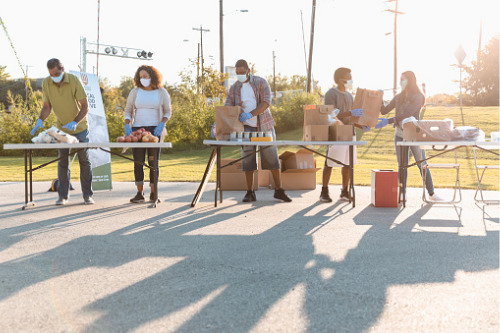

The Insurance Industry Charitable Foundation (IICF) recently released the 2020 IICF Insurance Industry Philanthropic Showcase, in which it highlights the collective strengths of the insurance industry in helping communities and enriching lives through grants, volunteer service and leadership.
This philanthropic work is more important than ever, especially in these challenging times when the world is battling a global pandemic. That’s something that IICF’s Key Partner Companies – those showing the highest level of leadership and support for IICF and its initiatives – demonstrated wholeheartedly in 2020.
One Key Partner – American International Group (AIG) - reinstated the AIG Foundation in 2020, which serves as the primary vehicle for the insurer’s philanthropic initiatives. The Foundation Board considers grantees through a diversity, equity and inclusion (DE&I) lens, while also aligning with AIG’s commitments to sustainability and citizenship, especially relating to financial security and community resilience.
Last year, AIG made an inaugural $5 million contribution to the newly reinstated AIG Foundation, which was primarily directed toward COVID-19 relief efforts. Three of its grantees, which the insurer said “meet the most critical needs with the broadest reach for COVID-19 relief” were International Medical Corps, Feeding America, and the US Chamber of Commerce Foundation’s Coalition to Back Black Businesses. The group also made a donation to the NAACP Legal Defense and Educational Fund, Inc. and to the Equal Justice Initiative, showing support for the black community in response to the civil justice protests across the US.
Read next: AIG selects new global head of operations
“As a result of our grant [to the US Chamber of Commerce Foundation’s Coalition to Back Black Businesses], over 60 black-owned businesses in five states across various industries received funding,” said Laura Gallagher, global head, corporate citizenship; president, AIG Foundation. “And out of those businesses that were reached, they represented a number of different dimensions of diversity. In addition to being black-owned, many of their owners also identified as veterans, LGBTQ+, and individuals with disabilities.
“AIG Foundation also made a $2 million grant to Feeding America to address food insecurity through nine different food banks. These were in various regions throughout the US that we identified in collaboration with Feeding America. Some are where we have a lot of employees and business, but we also worked with Feeding America to really identify where the needs were greatest at the time the grant was made.”
To balance out its external giving through the AIG Foundation, AIG also established a Compassionate Colleagues Fund, through which employees can help and support each other in their times of need. The Fund qualifies as a 501c3, which means it qualifies for AIG’s Matching Grants Program, through which AIG matches employee donations to qualifying non-profit organizations and schools 2:1, up to $10,000, for each employee per calendar year.
“Our timing couldn’t have been better [to launch the Compassionate Colleagues Fund] because Winter Storm Uri struck Texas soon after we launched the fund, and many of our employees found themselves in need,” said Gallagher. “This was a great way for the company and our employees to contribute to a fund, and for those employees who found themselves in need [of support], to apply for grants from the fund.”
Read more: AIG lines up massive business sale
Not only does AIG support its colleagues internally via financial grants, but the firm also encourages its employees to make a collective impact in their communities by volunteering. In 2020, AIG’s Volunteer Time Off (VTO) program gave employees three days off to volunteer in community service projects supporting causes they care about. In particular, employees were encouraged to volunteer for an organization focusing on education around the importance of DE&I, criminal justice reform, and human and civil rights.
“In addition to that, we hosted a 1,000 Acts of Kindness campaign, where we reached our goal really quickly. We put some incentives in place and made some donations which were in support of some of our participants’ activities,” Gallagher added. “And we also hosted a completely virtual food drive that resulted in approximately 265,000 meals that were given to food banks.
“We’re really proud of these efforts. I think it really showed our ability to pivot quickly given some of the situations that we found ourselves in, and really recognize some of the vulnerability and concerns that our employees had about their own communities.”
